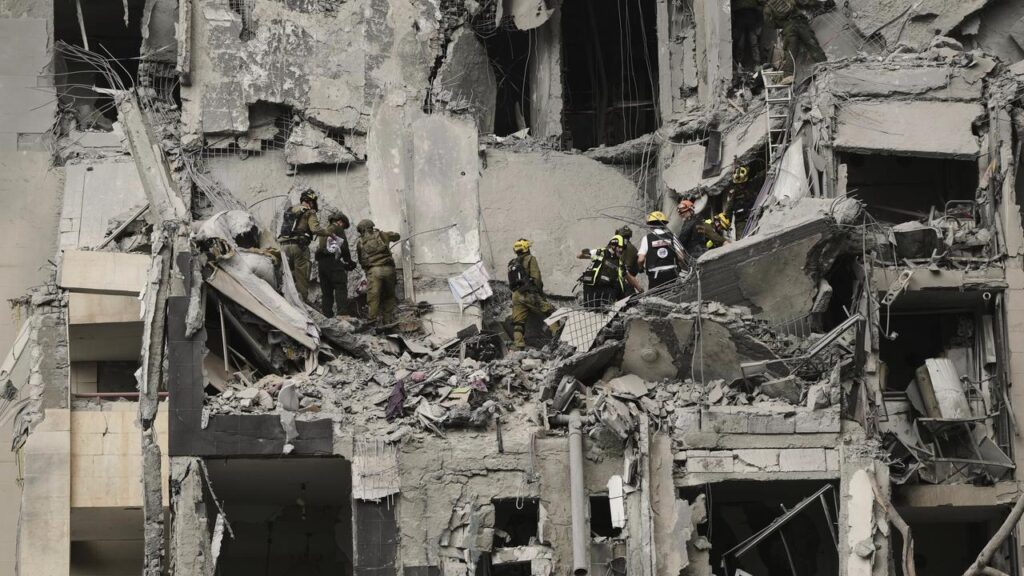Trump rebukes Israel for post-ceasefire strikes on Iran
Steve Holland, Andrew Mills and Parisa Hafezi |

US President Donald Trump has sharply rebuked Israel for its military response following a ceasefire deal, and accused both Israel and Iran of violating the agreement just hours after he announced it.
“I didn’t like the fact that Israel unloaded right after we made the deal. They didn’t have to unload and I didn’t like the fact that the retaliation was very strong,” Trump told reporters before leaving the White House for a NATO summit on Tuesday.
“In all fairness, Israel unloaded a lot, and now I hear Israel just went out because they felt it was violated by one rocket that didn’t land anywhere. That’s not what we want.”
Israeli Defence Minister Israel Katz had said he had ordered the military to mount new strikes on targets in Tehran in response to what he said were Iranian missiles fired in a “blatant violation” of the ceasefire.
Iran denied launching any missiles and said Israel’s attacks had continued for an hour and a half beyond the time the ceasefire was meant to start.
“ISRAEL is not going to attack Iran. All planes will turn around and head home, while doing a friendly ‘Plane Wave’ to Iran,” Trump, as he pressed both sides to abide by the ceasefire, posted on social media.
“Nobody will be hurt, the Ceasefire is in effect!”
Trump had earlier announced the ceasefire with a post: “THE CEASEFIRE IS NOW IN EFFECT. PLEASE DO NOT VIOLATE IT!”
Later in the day, Trump told reporters Israel launched its strikes almost immediately after the agreement was reached.
“Israel, as soon as we made the deal, they came out and they dropped a load of bombs, the likes of which I’ve never seen before. The biggest load that we’ve seen. I’m not happy with Israel,” he said.

Both Israel and Iran had confirmed the ceasefire after Trump’s announcement.
Israeli Prime Minister Benjamin Netanyahu said his country had achieved the goals it set in launching its June 13 surprise attack on Iran – to destroy its nuclear program and missile capabilities.
Iran’s top security body, the Supreme National Security Council, said its military had forced Israel to “unilaterally accept defeat and accept a ceasefire”, and it was ready to respond to any further aggression.
In the last reported strikes before the ceasefire, missiles killed four people in the southern Israeli city of Beersheba, the Israeli ambulance service said.
Iranian officials said nine people including a nuclear scientist were killed in a strike on a residential building in northern Iran.
Despite the early threats to the ceasefire, the response across the region and wider world was largely one of relief at the prospect of an end to the biggest direct confrontation ever between the two foes.
Israel attacked on June 13, hitting Iranian nuclear sites and killing the top echelon of its military command in the worst threat faced by the Islamic Republic since war with Iraq in the 1980s.

During the campaign, Israel said it was prepared to topple Iran’s clerical rulers if necessary to achieve its aims and struck symbolic targets unrelated to the military, culminating on Monday with a strike on Tehran’s Evin prison.
Iranian officials say hundreds of people have been killed in air strikes, but full information about the extent of the damage cannot be confirmed independently, with media tightly controlled.
Iran’s retaliatory missile strikes killed 28 people in Israel, the first time large numbers of Iranian missiles have penetrated its defences.
Trump entered the war on Saturday with strikes on Iranian nuclear sites buried under a mountain using huge bombs that Israel does not possess.
Iran had responded to the US participation in the air strikes by firing missiles on Monday at the biggest US military base in the Middle East, in Qatar.
No one was hurt in that strike, with Iran’s retaliation apparently calibrated to allow de-escalation afterwards.
The US had been negotiating with Iran to agree curbs to its nuclear program after Trump quit a previous agreement in 2018.
Iran has always said its nuclear program is peaceful.
with AP and PA
Reuters